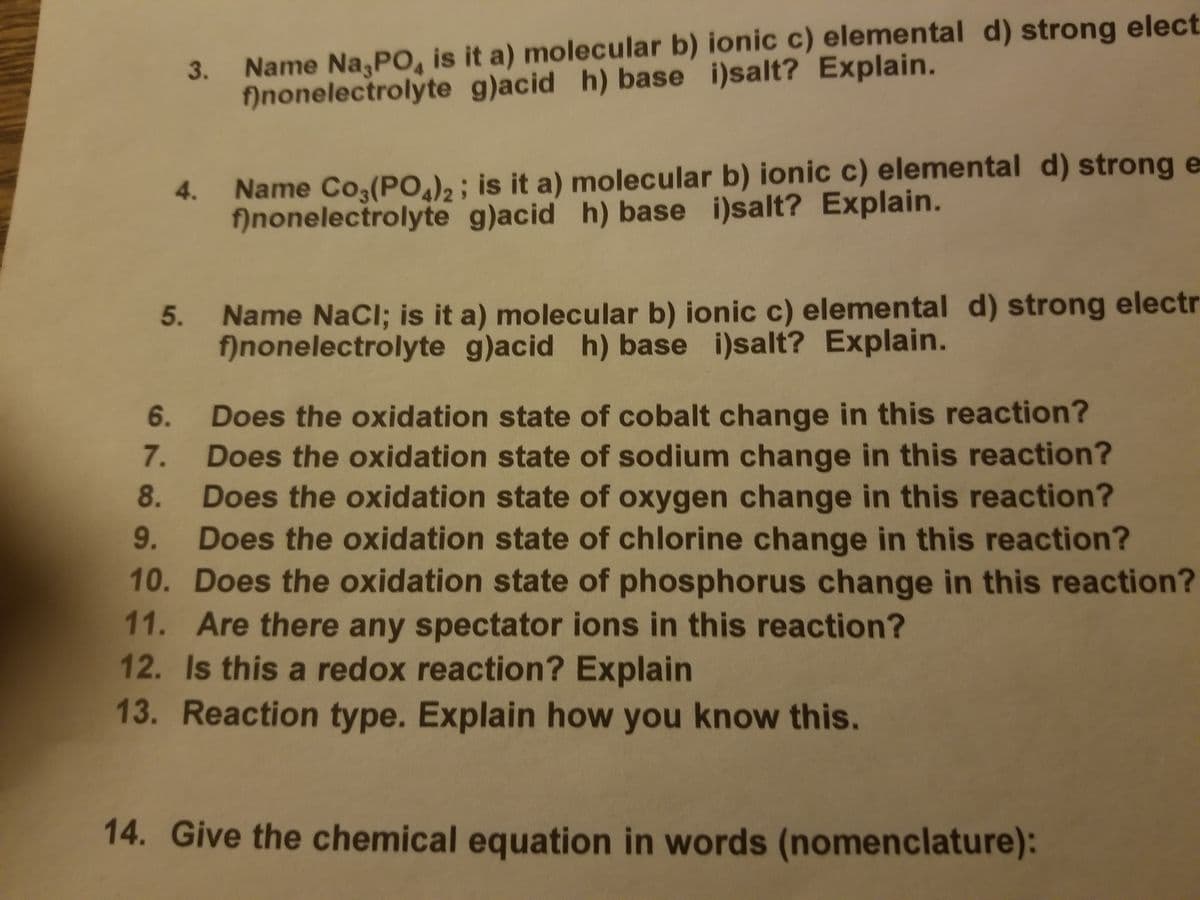3. Name Na,PO, is it a) molecular b) ionic c) elemental d) strong ele fAnonelectrolyte g)acid h) base i)salt? Explain. Name Co,(PO4)z; is it a) molecular b) ionic c) elemental d) strong fnonelectrolyte g)acid h) base i)salt? Explain. 4. 5. Name NaCl; is it a) molecular b) ionic c) elemental d) strong elect f)nonelectrolyte g)acid h) base i)salt? Explain.
3. Name Na,PO, is it a) molecular b) ionic c) elemental d) strong ele fAnonelectrolyte g)acid h) base i)salt? Explain. Name Co,(PO4)z; is it a) molecular b) ionic c) elemental d) strong fnonelectrolyte g)acid h) base i)salt? Explain. 4. 5. Name NaCl; is it a) molecular b) ionic c) elemental d) strong elect f)nonelectrolyte g)acid h) base i)salt? Explain.
Chemistry by OpenStax (2015-05-04)
1st Edition
ISBN:9781938168390
Author:Klaus Theopold, Richard H Langley, Paul Flowers, William R. Robinson, Mark Blaser
Publisher:Klaus Theopold, Richard H Langley, Paul Flowers, William R. Robinson, Mark Blaser
Chapter15: Equilibria Of Other Reaction Classes
Section: Chapter Questions
Problem 51E: Magnesium metal (a component of alloys used in aircraft and a reducing agent used in the production...
Related questions
Question
The reaction is CoCl2 + NaPO4---> CO3(PO4)2 +6NaCl

Transcribed Image Text:3. Name Na,PO, is it a) molecular b) ionic c) elemental d) strong elect
fînonelectrolyte g)acid h) base i)salt? Explain.
Name Co,(PO)2 ; is it a) molecular b) ionic c) elemental d) strong e
fînonelectrolyte g)acid h) base i)salt? Explain.
4.
Name NaCl; is it a) molecular b) ionic c) elemental d) strong electr
f)nonelectrolyte g)acid h) base i)salt? Explain.
5.
Does the oxidation state of cobalt change in this reaction?
Does the oxidation state of sodium change in this reaction?
Does the oxidation state of oxygen change in this reaction?
9. Does the oxidation state of chlorine change in this reaction?
6.
7.
8.
10. Does the oxidation state of phosphorus change in this reaction?
11. Are there any spectator ions in this reaction?
12. Is this a redox reaction? Explain
13. Reaction type. Explain how you know this.
14. Give the chemical equation in words (nomenclature):
Expert Solution
This question has been solved!
Explore an expertly crafted, step-by-step solution for a thorough understanding of key concepts.
This is a popular solution!
Trending now
This is a popular solution!
Step by step
Solved in 3 steps

Knowledge Booster
Learn more about
Need a deep-dive on the concept behind this application? Look no further. Learn more about this topic, chemistry and related others by exploring similar questions and additional content below.Recommended textbooks for you

Chemistry by OpenStax (2015-05-04)
Chemistry
ISBN:
9781938168390
Author:
Klaus Theopold, Richard H Langley, Paul Flowers, William R. Robinson, Mark Blaser
Publisher:
OpenStax

Chemistry by OpenStax (2015-05-04)
Chemistry
ISBN:
9781938168390
Author:
Klaus Theopold, Richard H Langley, Paul Flowers, William R. Robinson, Mark Blaser
Publisher:
OpenStax